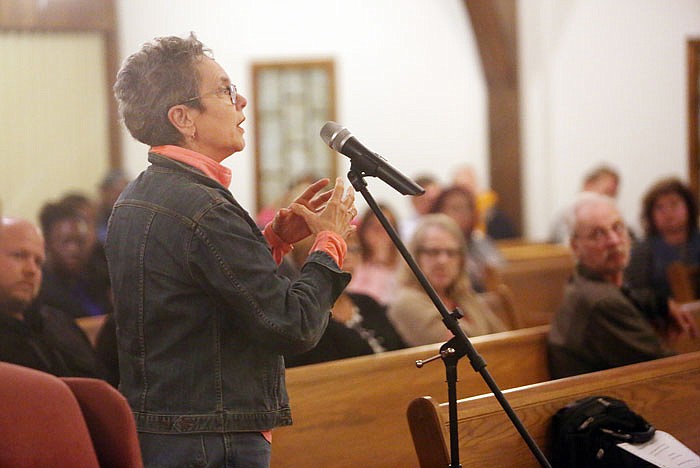The second meeting in a planned trilogy of town halls on racial disparities and inequities in Jefferson City focused on how to translate conversations into tangible actions.
The panel in front of Tuesday's audience at One in Christ Baptist Church consisted of Jefferson City Public Schools Superintendent Larry Linthacum, 5th Ward City Councilman Larry Henry, Mayor Carrie Tergin and Bishop James Howard Jr. of One in Christ. Rev. Jon Nelson moderated.
The racist photo incident last month involving three Jefferson City High School students spurred the creation of the community town halls, in addition to other upcoming community engagement events that the school district has announced.
People in the audience were appreciative such conversations are happening at all, but much of the talk Tuesday night focused on how the community will have to consciously construct an environment in its institutions and social spaces that fosters inclusion and a better understanding of racial issues.
On the part of the public schools, "we need to do our part and take responsibility," Linthacum said, but in addition to the district looking into how it can improve its hiring processes in an effort to create a more diverse body of staff, he added "I'm going to ask the question, 'what can the schools expect from parents and the community?'" in terms of teaching children the importance of diversity and inclusion.
More diverse staff within local schools and other public services like the city's police and fire departments are not simply going to be delivered from on high; the consensus Tuesday was such an outcome is going to take concerted efforts on the part of institutions, the leaders of those community bodies and the people they serve.
In terms of finding more diverse applicants for local positions, the question came up of why Lincoln University graduates are not being utilized more.
"For a time, the city never really touched Lincoln University as far as job recruiting," Henry said. "That's a problem. Those students at Lincoln have to stop being looked at as step-children in this community.
"We have to step up our efforts when it comes to recruiting as a city."
There's a wrinkle to addressing that: In the midst of Lincoln's financial troubles, the school is not receiving the full funding it could be as a land grant institution, while the University of Missouri is receiving the funding. "We can certainly advocate," Tergin said in answer to the question of what can the city do to fight harder for that funding, but "we don't have authority" to make a direct decision.
Decisions on the state level also to some extent control what kind of curriculum is available in public schools - curriculum that could better foster a consciousness about privilege and the power dynamics that especially shape the lives of economically disadvantaged people and people of color.
"I don't believe we have a racial diversity class," Linthacum said, although he added teachers have flexibility to decide how to accomplish the objectives required by the Missouri Learning Standards.
At one time, there were local bodies tasked with looking into issues of race. Tergin said she's open to looking into the idea of bringing back the city's multi-cultural commission, which she said went away years ago because leaders then decided other groups could do a better job than the commission.
To bring the commission back, she said it's going to take staff looking into feasibility and hearing a desire to do so from the community, as well as a willingness to serve on it. "The city could certainly step up, and in fact we're looking into that as we speak," she said.
Linthacum said the school district also had multi-cultural advisory committee that seems to have dissolved at some point in the transitions between the administrations of Linthacum and his predecessors Burt Kimble and Brian Mitchell. "Could we start that committee? Absolutely," Linthacum said. "Is that an option we're evaluating? Absolutely."

